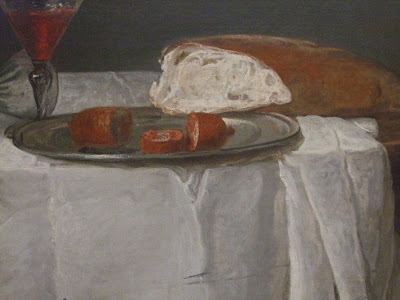



 Deleuze emphasizes folds as a metaphor for how concepts open up, how life opens up. Merleau Ponty uses folds to say that "unfold time behind us" or that time folds up behind us. There is this sense that as with a crease, we both sense and nonsense reality. Things are folded away from us. Things fold out. We have a sense of expansion and contraction, as with an accordion, that things can seem temporaly near but spatially distant, or vice versa. Like a gag trick folds indicate that more is nested in a problem than we supposed, or that more can be pulled out, as with the magician and the handkercheif, one after another. Or sentences in Tristram Shandy, containing subordination within suborination, parenthetically paranthetical and apositive alongside apositive.
Deleuze emphasizes folds as a metaphor for how concepts open up, how life opens up. Merleau Ponty uses folds to say that "unfold time behind us" or that time folds up behind us. There is this sense that as with a crease, we both sense and nonsense reality. Things are folded away from us. Things fold out. We have a sense of expansion and contraction, as with an accordion, that things can seem temporaly near but spatially distant, or vice versa. Like a gag trick folds indicate that more is nested in a problem than we supposed, or that more can be pulled out, as with the magician and the handkercheif, one after another. Or sentences in Tristram Shandy, containing subordination within suborination, parenthetically paranthetical and apositive alongside apositive.Artistically folds give us clues to the contour and mass of an object. A flat surface tells us nothing. As the surface becomes scarred, creased, differentially rubbed, more is disclosed. So a fold discloses even as it hides.
Deleuze uses the french Pli and its prefixes and suffixes: complicate, explicate - to describe how folds fit into our concepts of description.

No comments:
Post a Comment